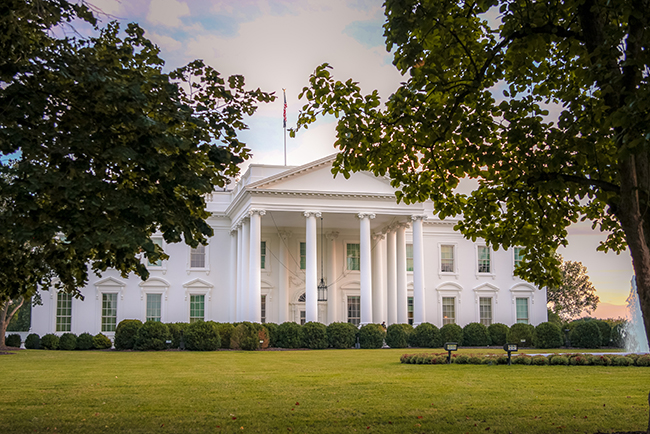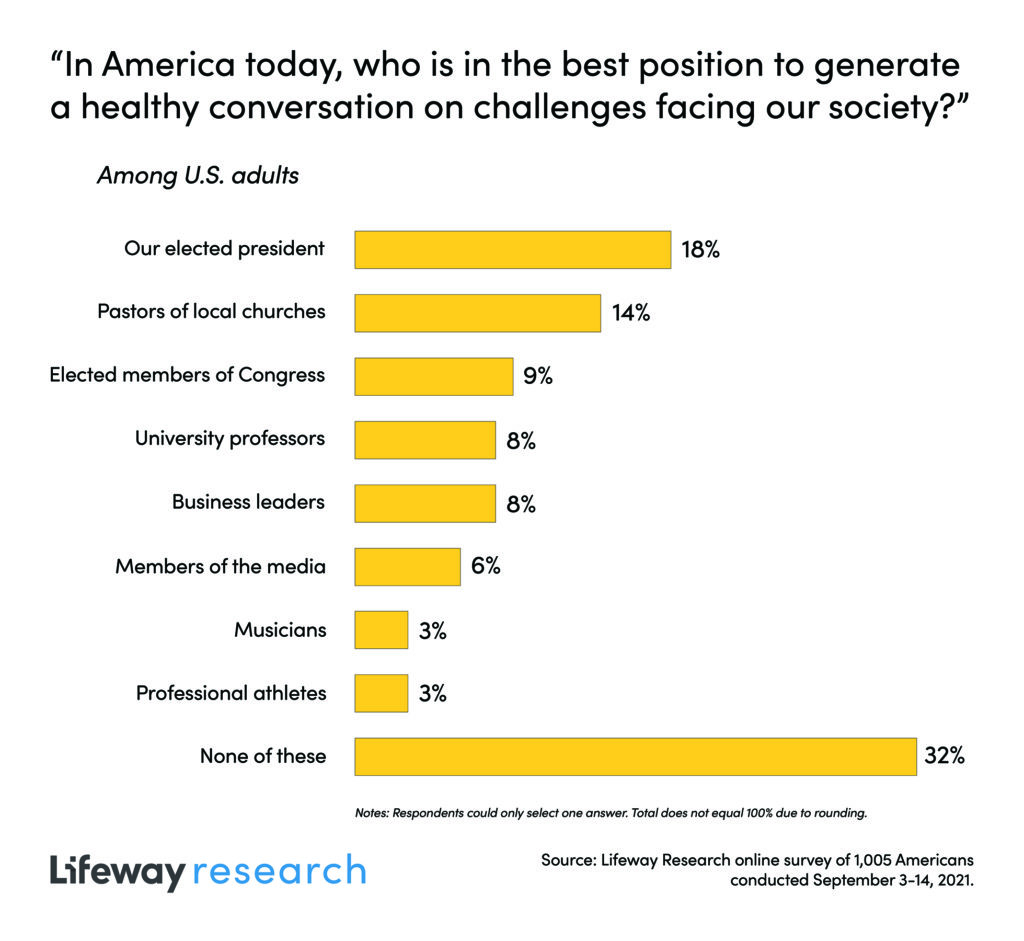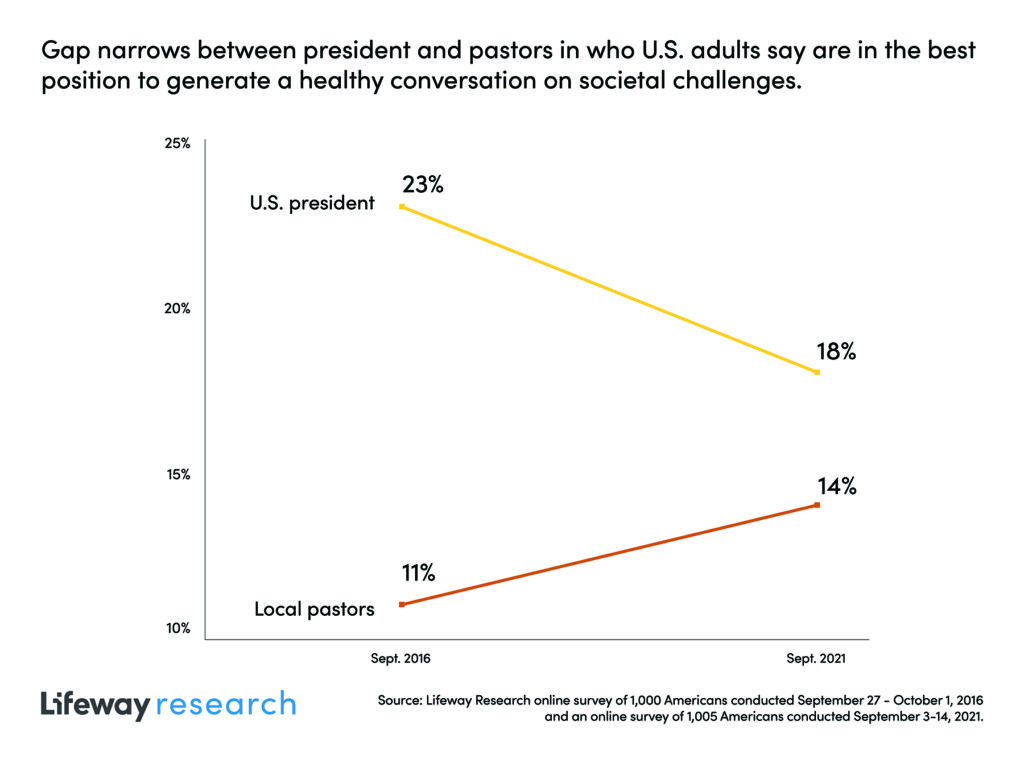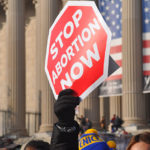
There is no consensus among Americans on who is in the best position to generate healthy conversations around challenges in society.
By Marissa Postell
Although Americans need to have productive conversations regarding challenges in our society, there is no consensus on who is in the best position to generate healthy conversations around these issues.
According to a study from Lifeway Research, fewer than 1 in 5 (18%) Americans say their elected president is in the best position to generate healthy conversations on challenges facing society. And 14% believe local church pastors are.
Fewer than 1 in 5 (18%) Americans say the president is in the best position to generate healthy conversations on challenges facing society, while 14% say local church pastors. Click To Tweet“A beautiful thing in America is that anyone can seek to lead productive conversations about problems in our society,” said Scott McConnell, executive director of Lifeway Research. “Sadly, very few Americans agree anyone is well positioned to do so.”
Fewer than 1 in 10 say elected members of Congress (9%), business leaders (8%), professors at universities (8%) or members of the media (6%) are most positively positioned to lead Americans in having healthy conversations about challenges in society.
Even though professional sports players and musicians often receive attention for public statements they make about issues Americans are facing, few Americans view athletes (3%) and musicians (3%) as thought leaders.

Nearly 1 in 3 Americans (32%) say none of the roles considered in this study are best positioned to lead healthy conversations on challenges in America.
Opinions have shifted slightly
Compared to a 2016 study conducted by Lifeway Research in September and October leading up to a major election, fewer Americans today say the president is in the best position to generate healthy conversations on challenges facing society (18% v. 23%). However, compared to the previous study, more Americans say elected members of Congress (9% v. 6%), professional sports players (3% v. 1%) and musicians (3% v. <1%).
Compared to prior to the 2016 election, fewer Americans today say the president is in the best position to generate healthy conversations on challenges facing society (18% v. 23%). Click To TweetAnd today, compared to 2016, there are a similar number of Americans who are looking to local church pastors (14% v. 11%), university professors (8% v. 10%), members of the media (6% v. 8%) or business leaders (8% v. 7%) to lead healthy societal conversations.
“Anticipation of a new president in 2016 likely led to more people hoping the elected president could lead healthy conversations,” McConnell said. “Midway through the next president’s first term, hopes for that office have faded with even less agreement on who could start or moderate needed discourse.”

Americans hold varying opinions
There are several key indicators of who Americans will view as holding the best position to generate healthy conversations on challenges in society. Males are more likely than females (10% v. 6%) to say business leaders are best positioned to lead these conversations, and those who are high school graduates or less are the least likely to say the same (4%).
A beautiful thing in America is that anyone can seek to lead productive conversations about problems in our society. Sadly, very few Americans agree anyone is well positioned to do so. — @smcconn Click To TweetOlder generations are more likely to look to pastors, while younger generations are more likely to look to university professors to generate healthy conversations. Those 50-65 (18%) and those older than 65 (18%) are more likely to say local church pastors than those 18-34 (9%) and 35-49 (11%). And those ages 18-34 (10%) and 35-49 (10%) are more likely to choose university professors than those 50-64 (5%).
Those in the South, where America is saturated with churches, are more likely than those in the West to say they look to pastors to lead healthy conversations (16% v. 10%).
Views from the pews
Even those who identify with a religious group or attend worship services hold varying opinions on where conversations about issues in society should be birthed. Catholics are more likely than Protestants to say healthy conversations should start with our elected president (22% v. 16%) or business leaders (12% v. 7%). Meanwhile, Protestants (22%) are more likely to say pastors of local churches should lead these conversations when compared to Catholics (9%), people of other religions (9%) or those who are religiously unaffiliated (3%).
Furthermore, those with evangelical beliefs are more likely than those without evangelical beliefs (32% v. 9%) to say healthy conversations should start with pastors.
Many have preferred solutions to society’s ills, but with no one trusted to stimulate or moderate a healthy discussion around them, achieving consensus will be rare. — @smcconn Click To TweetChristians who attend worship services at least four times a month (30%) are the most likely to look to pastors to generate conversations about challenges in American society.
“Society certainly has its problems, and productive dialogue on these challenges has become increasingly hard to find,” said McConnell. “Many have preferred solutions to society’s ills, but with no one trusted to stimulate or moderate a healthy discussion around them, achieving consensus will be rare.”
For more information, view the complete report.

Methodology
The online survey of 1,005 Americans was conducted by Lifeway Research Sept. 3-14, 2021, using a national pre-recruited panel. Quotas and slight weights were used to balance gender, age, region, ethnicity, education and religion to more accurately reflect the population. The completed sample is 1,005 surveys. The sample provides 95% confidence that the sampling error from the panel does not exceed plus or minus 3.3%. This margin of error accounts for the effect of weighting. Margins of error are higher in sub-groups.
Evangelical Beliefs are defined using the NAE Lifeway Research Evangelical Beliefs Research Definition based on respondent beliefs. Respondents are asked their level of agreement with four separate statements using a four-point, forced choice scale (strongly agree, somewhat agree, somewhat disagree, strongly disagree). Those who strongly agree with all four statements are categorized as having Evangelical Beliefs.
- The Bible is the highest authority for what I believe
- It is very important for me personally to encourage non-Christians to trust Jesus Christ as their Savior
- Jesus Christ’s death on the cross is the only sacrifice that could remove the penalty of my sin
- Only those who trust in Jesus Christ alone as their Savior receive God’s free gift of eternal salvation








